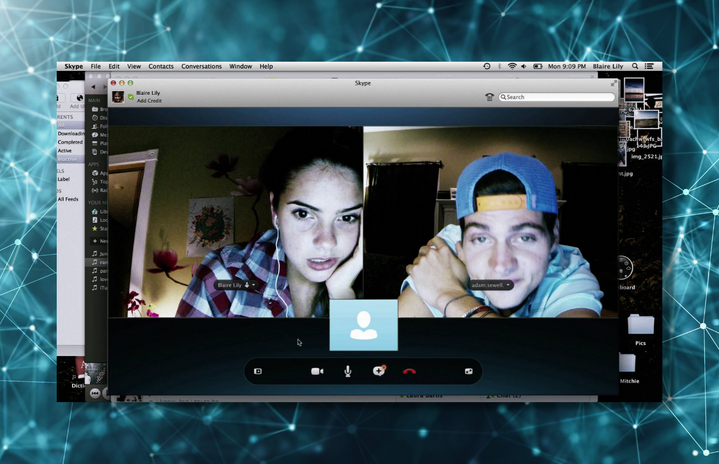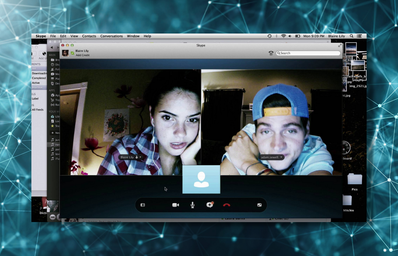TW: This piece continues mentions of self harm, harassment, grooming.
I was 12 years old when I saw a penis for the first time. Illuminated only by the screen of my iPod touch, I scrolled through a little chat app called “kik” that some other girls in school told me to download as a way to make new friends on the internet. It was way past my bedtime, and I had slyly taken my iPod out of my parents room while they were sleeping. After all, I needed to continue my journey on the Oregon Trail – as all 12 year olds do. I had no idea that I would encounter online trauma–I didn’t even know what that was.
A lonely preteen, I found solace in talking to people on the internet. They didn’t know who I really was, so I could be anyone. I enjoyed chatting to people that were (supposedly) from different countries or states who were (supposedly) also twelve. I also enjoyed the compliments I would get from these people, specifically the boys who would text “ur so hot uwu XD rawr.”
After mindlessly scrolling for a few minutes, I got a notification that “Connor,” a 16-year-old model from the UK (again, supposedly), sent me a photo. I clicked on the notification and waited as the picture loaded. Is it from a new modeling shoot he was on? Or maybe a funny meme?
But when the picture loaded, I didn’t see a cute tumblr boy. And I didn’t see a cartoon meme about tacos or dinosaurs or whatever obscure object I was hyper fixated on at twelve. I saw the fully erect penis of a much, much older man. This moment changed the trajectory of my sexual experiences, and I became a member of the Omegle Generation.
When we’re young, we often brush off traumas and dismiss them as just “weird situations” or “uncomfortable instances.” Staring at the erect penis at 12, with no comprehension of what a penis actually is, was a trauma. It was sexual harassment. And it didn’t happen to just me.
A 2019 study conducted by researchers at the Florida International University found that one in 12 people are victims of “nonconsensual pornography,” which means recieivng explicit photos without consent. A similar 2021 study by the National Society for the Prevention of Cruelty to Children found that 84% of internet grooming advances were targeted to young girls and young women. Sadly enough, this is in no way a surprise statistic.
Growing up in the digital age, apps and websites like “kik,” “Omegle,” and chat roulette were a normalcy on iPods and laptops all over the world. However, as trendy as these online chat forums were at the time, they have left many members of Gen Z traumatized years after the offenses. I spoke to other Gen Z-ers to unpack their online trauma, and how being a part of the “Omegle Generation” has impacted their lives.
The Omegle to online sexual harassment pipeline
In 2022, online trauma is no longer a rarity. While there have been groups like the NSPCC rallying for safer internet usage for children, many harmful instances went under the radar during the infancy of sites like Omegle and kik.
Lola,* 22, was on the popular video chatroulette site “Omegle” at age 13 when she met a guy who seemed to be around her age. His name was Matt* and he was 16 (Lola’s positive that’s a lie now). After chatting on Omegle for a while, they exchanged kiks and other social media and began communicating regularly.
“I literally told him everything,” Lola tells Her Campus. “He was flirty, so, of course, 13-year-old me ate that up. I think I was too young to realize that it was anything malicious, so we ended up texting for several years afterwards. When I was about 16, he started asking me for nudes and saying all kinds of lewd comments.”
A 2021 Pew Research Center survey found that 41% of Americans have experienced some form of online sexual harassment, whether that be nonconsensual pornography bullying, or persistent attempts to recieve intimate photos. 25% of that experienced major forms of online sexual harassment such as stalking or physical threats.
“I didn’t think it was wrong, but looking back, it really was,” Lola says. “I’m so glad I listened to that voice in my head and cut the relationship off.”
Virtual grooming and sexual violence.
Mari,* 22, started using apps like Omegle and kik at just 11 years old. As a writer, Mari was using a website called “Quotev” where she could publish her stories, quizzes, and blog posts on a faceless internet space. However, what started out as an innocent creative space quickly led her onto a dark and traumatic path.
“I found out about kik on Quotev when I was 11, and a supposedly sixteen year old boy named ‘Johnny’ started talking to me,” Mari tells Her Campus. “We met through Quotev and he told me to download kik so we could talk more. I didn’t think it was weird or anything, it was just what people did.”
Mari talked to Johnny for several weeks, sharing intimate aspects of her life and family before he ultimately vanished.
“He told me he was my boyfriend, but I couldn’t tell anyone,” she says. “He was the first person to call me pretty. And then he just disappeared one day. I didn’t know what happened.”
At this same time, Mari was also chatting with another person on kik named “Danika.” The two also met on Quotev, hit it off, then moved to kik to continue their conversations. Danika was supposedly 17, but at the time, Mari didn’t see anything wrong with making a new friend.
“I think she struggled a lot with mental illness, she was the first person to introduce me to self harm,” Mari says. “She was always flirting with me and I didn’t know what was going on, but I liked the attention and I felt safe. Danika always wanted to sext with me and I didn’t know how, so I never sent her anything. But she was always sending me dirty messages.”
Over time, Mari and Danika’s online relationship became darker and more violent.
“I cut myself for the first tie because she said it helped her,” Mari says. “And she was older than me, so I listened. I didn’t know any better and it introduced me to things that I didn’t know about. She really f*cked me up.”
Mari and Danika’s relationship ended, however, when Danika sent two different photos of her face – leading Mari to realize that Danika was not, in fact, the person she claimed to be. To this day, Mari still struggles with her mental health as a result of these online interactions.
The impact of online trauma on Gen Z
Although these instances of internet trauma took place about 10 years ago, their impact still stays with members of Gen Z, and influences how they approach the internet and relationships. “Looking back, he was a groomer,” Lola says. “It definitely made me realize that not everyone has the best intentions for you, even though it seems like it.”
Mari’s exposure to online trauma also shaped her perception of herself. “It really messed up my relationship with myself,” Mari says. “I’ve struggled with self harm ever since because some older girl persuaded an eleven year old into hurting themselves. I think that these apps do far more harm than good: they made me lonely and scared and isolated during a time where I should have been happy and growing up.”
The 2021 Pew Research Center found that out of those who experienced severe forms of online harassment, 51% still find these instances “extremely” or “very” upsetting. Similarly, in a study done in the Universal Journal of Psychology, it was found that children that experienced some form of internet trauma were more likely to seek counseling for issues relating to anxiety, depression, and other mental issues.
“Because their self-image is still developing, children are more traumatized by disturbing online images and messages,” John F. Tholen, PhD, a cognitive psychologist, tells Her Campus. “Childhood traumatization strongly affects our adult self-talk—the internal monologue that streams through our waking consciousness, interprets our every experience, and establishes our perspective on both ourselves and the world around us. When dysfunctional thoughts are allowed to go unchallenged and occupy the focus of our attention, they invade our self-talk, inhibit self-assertion, and disrupt our peace of mind—even though dysfunctional ideas are almost always incomplete, unreasonable, or completely wrong. As children who have been subjected to online trauma mature, therefore, they are more likely to experience self-doubt, anxiety, and depression, the symptoms that lead us to seek therapy.”
Tholen also goes to say that experiencing trauma, like online harassment, can impact a child’s interpersonal relationships as they mature and develop.
“Self-talk that questions our abilities or worthiness tends to undermine all our efforts to attain important goals, including the development of personal relationships. When our automatic thought is ‘maybe I’m undeserving’ or ‘maybe I’m inadequate’ because of trauma, we both become less attractive to healthier potential partners and expect—and settle for—less.”
The impact of being online at a young age.
As the years go by, technology is becoming more and more integrated into our lives and the lives of children. According to a 2020 statistic from Pew Research Center, 80% of parents report that their children between the ages 5-11 use smartphone technology and tablets daily. Similarly, in a survey conducted by Microsoft of American parents, it was found that the average age that parents allow their children to independently access the internet is eight years old.
“The internet has made it possible for us to bring the entire world into our lives, but also exposes us to the most disturbing images and vile online attacks,” Tholen says. “This type of traumatic exposure can reshape our mind in unwanted ways that—left untreated—can sometimes persist indefinitely.”
The internet isn’t going anywhere and, in turn, neither is the trauma it causes. For Gen Z, growing up in the digital age equipped us with a better knowledge of technology, but at what cost? Although this trauma is a constant battle to overcome, it’s essential to realize that you aren’t alone — and that none of it is your fault.
“Trauma does not have to stay with us forever,” Tholen says. “Our mind has a natural capacity for emotional recovery like our body’s ability to heal itself. You are only human, and you were a child. And you are better off apart from anyone who would be so unreasonable as to think less of you because you had the misfortune of being traumatized.”
If you or someone you know is seeking help for mental health concerns, visit the National Alliance on Mental Illness (NAMI) website, or call 1-800-950-NAMI(6264). For confidential treatment referrals, visit the Substance Abuse and Mental Health Services Administration (SAMHSA) website, or call the National Helpline at 1-800-662-HELP(4357). In an emergency, contact the National Suicide Prevention Lifeline at 1-800-273-TALK(8255) or call 911.


